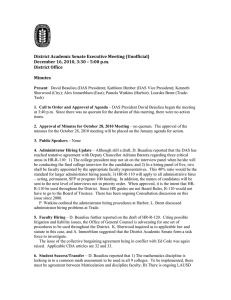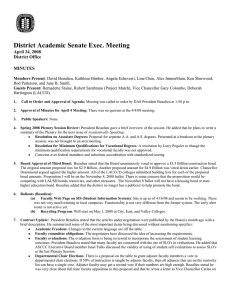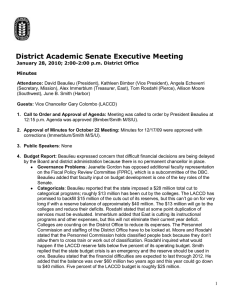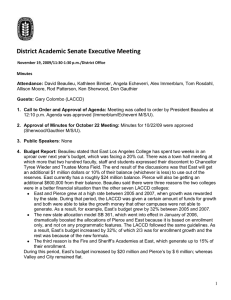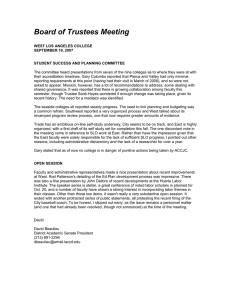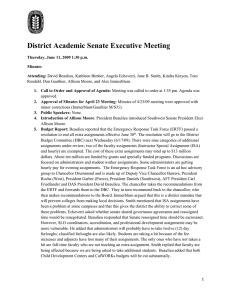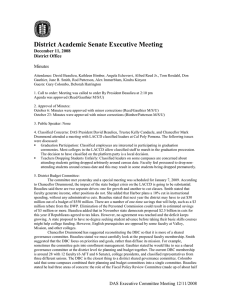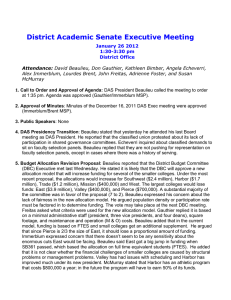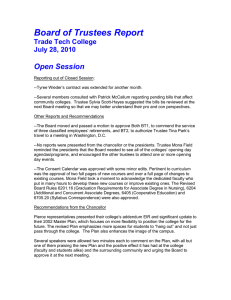District Academic Senate Executive Meeting
advertisement
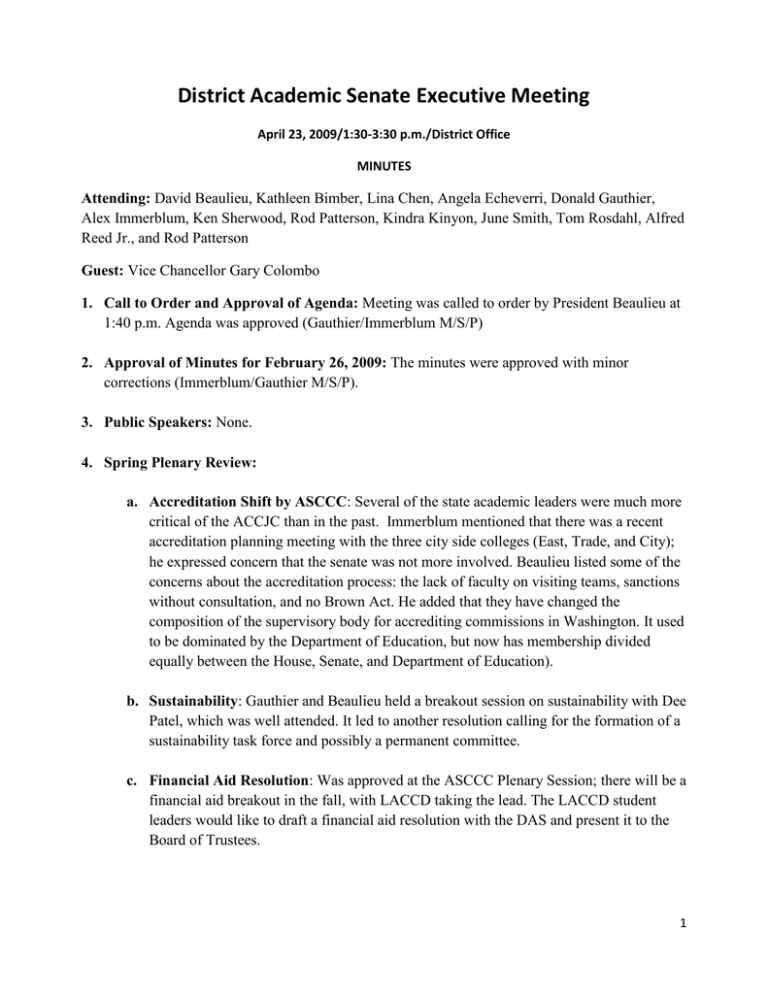
District Academic Senate Executive Meeting April 23, 2009/1:30-3:30 p.m./District Office MINUTES Attending: David Beaulieu, Kathleen Bimber, Lina Chen, Angela Echeverri, Donald Gauthier, Alex Immerblum, Ken Sherwood, Rod Patterson, Kindra Kinyon, June Smith, Tom Rosdahl, Alfred Reed Jr., and Rod Patterson Guest: Vice Chancellor Gary Colombo 1. Call to Order and Approval of Agenda: Meeting was called to order by President Beaulieu at 1:40 p.m. Agenda was approved (Gauthier/Immerblum M/S/P) 2. Approval of Minutes for February 26, 2009: The minutes were approved with minor corrections (Immerblum/Gauthier M/S/P). 3. Public Speakers: None. 4. Spring Plenary Review: a. Accreditation Shift by ASCCC: Several of the state academic leaders were much more critical of the ACCJC than in the past. Immerblum mentioned that there was a recent accreditation planning meeting with the three city side colleges (East, Trade, and City); he expressed concern that the senate was not more involved. Beaulieu listed some of the concerns about the accreditation process: the lack of faculty on visiting teams, sanctions without consultation, and no Brown Act. He added that they have changed the composition of the supervisory body for accrediting commissions in Washington. It used to be dominated by the Department of Education, but now has membership divided equally between the House, Senate, and Department of Education). b. Sustainability: Gauthier and Beaulieu held a breakout session on sustainability with Dee Patel, which was well attended. It led to another resolution calling for the formation of a sustainability task force and possibly a permanent committee. c. Financial Aid Resolution: Was approved at the ASCCC Plenary Session; there will be a financial aid breakout in the fall, with LACCD taking the lead. The LACCD student leaders would like to draft a financial aid resolution with the DAS and present it to the Board of Trustees. 1 d. Other resolutions approved: One regarding the Basic Skills Initiative (see below) and one about including the needs of gay and lesbian students in curricula and extra-curricula considerations, as is done for other minority students. 5. DE Coordination-May 8 Meeting: Beaulieu stated that he met with Paul McKenna (Mission), Joe Perret (Pierce), and Gary Colombo yesterday to plan the next DE meeting. An agenda and participation list will be sent out soon. The meeting will take place on Friday, May 8th from 9:30 am to 12:00 at City College. DE coordinators, a couple of deans, and senate representatives will be invited. The key question will be what level of district coordination would be helpful for Distance Education. Immerblum pointed out that the date conflicts with the regional Basic Skills meeting being held at Los Angeles Mission College. Beaulieu added that ITV will be on the agenda eventually. Reed mentioned that there were several different concerns expressed about DE, including out of state tuition, financial aid, student support, DE coordinator qualifications and reassigned time for coordinators. 6. CTE Coordination Meeting-April 28: A second CTE planning meeting will take place on Tuesday, April 28th at 2:00 pm to ask what degree of coordination the district should have for CTE programs. Beaulieu stated that the point of the meeting is to create a larger CTE group to drive district CTE planning, instead of having CTE deans make all decisions. The meeting will allow faculty representatives to interact with the CTE deans. Each campus should have at least one faculty representative. Bimber stated that CTE innovation funds are being handled differently at each campus. She added that some deans have taken the position that these funds can only be used for green programs, which is not accurate and can hurt existing CTE programs. Gauthier added that at Valley the funds are being used for green and innovative programs only. Kinyon stated that something similar is happening at Trade. 7. DCC Report (Bimber): a. Changes to ESL: SouEnglish Subject Cthwest wanted to change the subject of English 83 from English to ESL; the content of the course is ESL. Valley challenged the change of subject request. After hearing from both campuses, DCC recommended moving the challenge by Valley forward, because a discipline other than English made the change without approval from that discipline and attempted to impose that change district-wide. . The vote to deny the change from English to ESL was 5 to 2, with one abstention. The decision was appealed by Southwest and therefore the matter will go to the DAS; there is a timeline in E-65 that must be followed. The underlying issues are that there is another discipline teaching ESL content and tracking who has proper qualifications to teach ESL is more difficult. Bimber added that if the state audits a college and finds out that ESL content courses are being taught by faculty who do not hold the proper MQs, the grade can be removed. Beaulieu stated that this case was different and more clear-cut than the Speech/ESL issue that came up last year. He added that the minimum qualification issue can be solved technically, by flagging the 2 courses to make sure faculty are qualified. There has to be a broader discussion on whether it is appropriate for one discipline to teach content of another discipline in face of the unanimous objection by the opposing discipline committee. Some of Valley’s arguments included that the change would separate English and ESL faculty against their wishes, teaching ESL content under the English subject makes for a more natural progression from ESL to English, there wre concerns that faculty will lose seniority, and some students prefer to take classes in English instead of ESL. Southwest’s position was that it was insulting to imply that ESL had a derogatory connotation. Beaulieu added that part of the problem is that the disciplines are closely related and advanced ESL courses are pretty close to English 21 courses. Immerblum added that before AB1725 was passed 21 years ago, faculty hired under English could also teach ESL and courses were labeled English. Faculty that were hired before AB1725, were grandfathered in to be able to teach both English and ESL. Once the discipline list came out, the colleges did not catch up to the change right away. East has made the subject change for English 82-86 and Harbor is planning to do so. Beaulieu summarized the consensus of the group as follows: We give deference to local control as a rule, but we must insist that all courses be taught with the appropriate minimum qualifications. Beaulieu added that there are courses for which there could be multiple MQs, such as advanced ESL or a Speech courses. Immerblum inquired whether the DAS would vote on the issue at the next meeting and asked for statements from opposing sides before the vote takes place. b. Repetition of Activity Courses (E-103): Will be an action item for May 14. It outlines who can do repeatability. c. Curriculum and Course Approval (E-65), Title 5 Changes-Action Item: Changes are towards the end on page 8. They extend the working days for the curriculum review process. The changes specify that curriculum work stops between July 1 and August 15, but can take place in January and the rest of the summer. d. Alignment of Subjects with Minimum Qualification Areas (E-XXX)-Action Item: There is a need to determine more clearly how to assign MQs for new disciplines and to review MQs for existing disciplines. The draft was discussed at the former DAS and Executive meetings. e. Competency requirement (E-79)-Action Item: Bimber mentioned that Elizabeth Atondo and Beaulieu met with the Math Discipline Committee to review E-79. They added Math 124 A and B, which are equivalent to Math 125. An A.P. exam with score of 3 or higher was also approved, but not Statistics I. Statistics I has Math 125 as a prerequisite, but can be taught by non-Math faculty. The only campus that offers a large number of Statistics I classes is Pierce. 3 8. EPAC Report (Bimber): a. Student Grievance Procedures (E-55)-Action Item: Have discussed this before and have been reviewing the document again in recent years. Will come up for a vote at the 5/14/09 DAS meeting. b. English Alternate Criteria: The English Discipline Committee reaffirmed the one they approved in 2005. However, it is not clear that it was approved by all proper channels at that time because there was no sign-off from the senate. c. Alternate Titles for Non-Credit basic Skills: Want to determine the noncredit basic skills minimum qualifications for social studies and humanities and have come to a pretty good resolution. The liberal studies MQs have been more difficult to establish; originally a guideline to allow any discipline taught within the IGETC or CSU certification was proposed. However, physical education, which is listed under CSU certification, may not be appropriate for teaching Basic Skills. As a result, we may need to restrict to disciplines in certain areas within these certifications. d. Beaulieu added that they are working on ways to expedite the equivalency process. 9. Union Issues: a. Nursing Task Force: Bimber stated that she served on the AFT task force that was formed to address the assignments, load, and compensation of faculty in nursing and other disciplines that had extensive preparation work. Last fall (2008) the task force began to review whether the nursing load issue could be resolved by changing the curriculum. D. Beaulieu contacted D. Sparks to let him know that this was a senate matter and should not be under the purview of the union. K. Bimber began attending the taskforce as a senate representative on a joint taskforce. After a series of meetings, the taskforce developed an MOU that increases the reassigned time for vice chairs from 1/9 to 0.2 to 0.5 (D-basis) depending on the campus. The other two recommendations involved a common curriculum and a uniform application processes. Bimber has not seen the final document and expressed concern that it contained non-union issues. The administrators on the task force refused to allow the Nursing District Discipline committee request to change the load from an 18 hour load to a 15 hour load, because it would require hiring a large number of faculty. According to the Nursing representatives on the taskforce, the common curriculum developed by the Nursing District Discipline committee that would address some of these load concerns can’t go forward until the load issue is resolved. The task force settled on the increased reassigned time for the Vice Chair with a recommendation that the other two items listed above be considered at a different date. 4 b. Article 33 (Hiring Procedures): Handouts with language from the previous (05-08) and new contracts were distributed. Beaulieu expressed concern that a significant amount of language had been added to Article 33 without consulting the DAS. The language in the previous contract is very short (three lines); the new language is much more extensive and specifies what the Hiring Prioritization Committee can do. This is problematic because the FHPC is a Senate committee. Beaulieu does not recall reading these changes. Immerblum mentioned that the language specifies replacement and new faculty positions and states: “This will be done via an agreed upon process among the AFT, Academic Senate, and college president”. Kinyon stated that the Trade AFT Chapter Chair is now claiming that their hiring policy is invalid and is trying to get the president to rescind it. Kinyon wrote to Chancellor Drummond to clarify the matter, but her concerns have not been fully addressed. Immerblum added that he will be meeting with his AFT Chapter President to discuss the implications of the new language. Beaulieu expressed his opinion that this language seems to be an egregious overreach by the AFT and encroaches on the Senate’s role in hiring. Beaulieu stated the DAS should identify all language that intrudes on the senate’s authority, including AFT representation on the Curriculum Committee. The AFT argument for this is that in AB1725 any specifications in contracts pre-existing before 1988 can continue. Immerblum listed his concerns with the new version of Article 33: Discusses new faculty as well as replacement faculty positions If the college president doesn’t agree with the FPHC list, he/she sends the revised list back to the FHPC. He argued that the Senate should send the list forward and any changes made by the president should be sent back to senate. Listing of criteria that the college FHPC should use for prioritization Beaulieu stated that this issue can be discussed extensively at the next consultation meeting on Friday, May 15, at 1:00 pm. 10. DBC Report (Beaulieu): a. State Budget Update: If the May 19th election does not go well, we need to brace ourselves for some deep and painful cuts. We are looking at a minimum cut to the LACCD of $20 million and possibly as high as $75 million for next year. Our annual budget is $600 million; a $30 million cut would be 5% of the LACCD budget. The Sacramento Report and the DBC minutes have the latest budget information. The LACCD is looking at increasing its budget through grants. Patterson mentioned that West is advertising three to four grantwriting positions. b.Proposed Role Change for DBC: Not much has happened; not a burning issue. 11. Bond Steering Committee Update: Larry Eisenberg has not been very happy about pressure from the faculty. 5 a. Shared Governance Oversight of Projects b. Design Build Preparation: Have hired a firm to help brief people about the DB process and help them participate. c. Summit Proposal: The summit is in September. It might be helpful to focus the event on facilities and bringing people up to speed on many of the issues (Measure J, Design Build, Energy Plans, and LEED Certification). There have been a lot of complaints that Build LACCD and Larry Eisenberg have not been communicating with faculty enough. d. Energy Plan: Gauthier stated that there is no real flexibility in the design of solar panel farms, because third parties purchase the equipment. East, West, and SW are going forward with solar power purchase agreements with Edison, but other campuses need to wait for DWP willingness to enter into such agreements. 12. SSISC Report (Colombo): a. Arts Enrichment Listserv: There are a number of partnership programs between the LACCD and the Getty, Autry, LA County Museum of Art, and others. Colombo wants to advertise the programs across the district and e-mails will be sent out to all faculty. Some of the activities include workshops and roundtable discussions. LACMA is seeking funding to extend workshop opportunities to students to work with professional photographers from six different continents. Faculty can sign up for the Listerv to be notified of activities. These activities are open to faculty in all disciplines, not only the arts. b. Accreditation: Colombo distributed a handout with a timeline for accreditation. He stressed the importance of the year 2012, in which the three sea-side colleges will have site visits, the three valley colleges will be finishing up self studies, and all SLOs must have been assessed with evidence of improvement. Colombo will give a presentation to the DAS about the role of faculty in accreditation. He added that we won’t know the outcome of the recent city side accreditation site visits until July 1. c. Basic Skills Initiative: The most recent Rostrum has an article by Barbara Illowsky on the BSI, which is very positive and discusses the regional networks. Colombo expressed surprise at the recent ASCCC approval of an emergency resolution that was very critical of how the State Chancellor’s Office handled the BSI award, in particular with having administrators run the program (in this case, LACCD ones). The LACCD became the lead entity after San Francisco City College neglected to file a letter of intent with the chancellor’s office. However, the political fallout has been considerable, which has been discouraging to Deborah Harrington and Gary Colombo. They are questioning whether they 6 want to continue leading the BSI effort in the future. Beaulieu reiterated his long time opposition to LACCD being involved in a lead role. 13. DAS Organization: Postponed. a. Two Vice Presidents Suggestion b. Other Reforms 14. Hiring Policy Clarification: This is an East issue about long term substitutes being hired without a second interview. 15. Suspension of ASO Officers: Smith stated that the Harbor administration removed the ASO President. She has brought her case to the Board, which has not been sympathetic. The faculty does not know what is going on and it is a terrible mess. Beaulieu mentioned there are two other campuses (Pierce and Valley) where there are suspensions of ASO officers. 16. Treasurer’s Report: Lina Chen reminded delegates to turn in their conference reimbursement forms. 17. Proposed Future Actions and Announcements: None 18. Adjourn: Meeting was adjourned at 4:30 pm. Minutes submitted respectfully by DAS Secretary Echeverri 7
